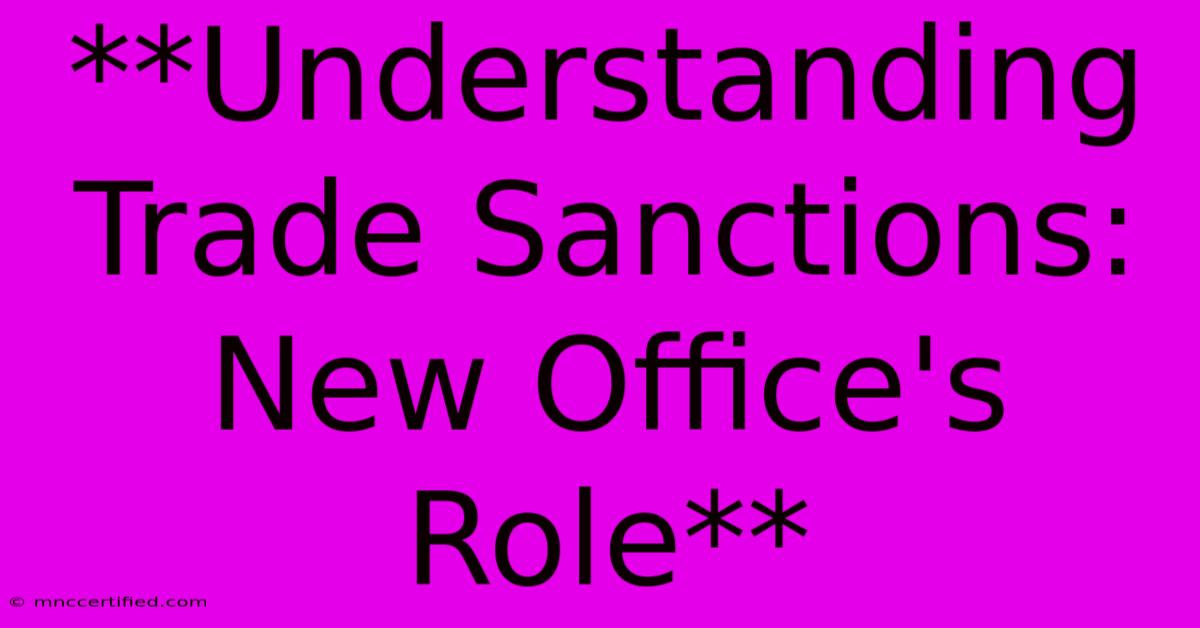**Understanding Trade Sanctions: New Office's Role**

Table of Contents
Understanding Trade Sanctions: The New Office's Role in a Complex World
The world of international trade is constantly evolving, and understanding the intricacies of trade sanctions is more crucial than ever. These economic and political tools can have significant impacts on businesses, individuals, and even global economies. With a growing number of nations imposing sanctions, it's essential to comprehend their purpose, implementation, and the role of a dedicated office within the government.
What are Trade Sanctions?
Trade sanctions are governmental actions that restrict or prohibit trade with a specific country or entity. They can take various forms, including:
- Import/Export restrictions: Limiting or prohibiting the flow of goods and services between nations.
- Financial sanctions: Freezing assets, restricting financial transactions, or barring access to financial markets.
- Travel bans: Prohibiting individuals from entering or leaving a country.
- Technology restrictions: Limiting the export of sensitive technology or equipment.
Why are Trade Sanctions Imposed?
Trade sanctions are often implemented to:
- Punish or deter harmful actions: This could include human rights violations, terrorism, or aggression against other nations.
- Promote political change: Applying pressure on a country to adopt specific policies or reforms.
- Protect national security: Restricting access to sensitive technologies or materials.
- Enforce international law: Supporting international agreements and holding countries accountable for violations.
The New Office: A Dedicated Hub for Trade Sanctions
Recognizing the growing importance of trade sanctions, many governments are establishing dedicated offices to manage and coordinate their implementation. These offices serve various functions, including:
- Policy development and coordination: Collaborating with other government agencies and international partners to formulate and implement sanctions policies.
- Enforcement and compliance: Monitoring compliance with sanctions regulations and investigating potential violations.
- Outreach and education: Communicating sanctions policies to businesses, individuals, and the public.
- International engagement: Coordinating with other nations to ensure a unified approach to sanctions.
The Impact of Trade Sanctions: A Two-Sided Coin
Trade sanctions, while intended to achieve specific objectives, can have both positive and negative consequences.
Potential benefits:
- Achieving policy goals: Sanctions can influence countries to change their behavior and comply with international norms.
- Protecting national security: They can prevent the spread of sensitive technologies or materials.
- Promoting human rights: They can put pressure on countries to improve their human rights records.
Potential drawbacks:
- Economic hardship: Sanctions can disrupt trade and investment, leading to economic hardship and unemployment.
- Humanitarian concerns: They can impact access to essential goods and services, potentially harming civilians.
- Escalating tensions: Sanctions can fuel tensions and lead to further conflict.
Navigating a Complex Landscape: Key Takeaways
Understanding trade sanctions and the role of dedicated offices is crucial for businesses, individuals, and policymakers. By recognizing the potential benefits and drawbacks, and by actively engaging with these offices, we can navigate this complex landscape effectively and contribute to a more peaceful and prosperous global environment.
Remember:
- Stay informed about evolving sanctions policies and regulations.
- Consult with legal experts and the dedicated trade sanctions office for guidance.
- Engage in ethical and responsible business practices to avoid violating sanctions.
By fostering open dialogue and cooperation, we can work together to ensure that trade sanctions are used responsibly and effectively in a world increasingly reliant on global trade and economic cooperation.

Thank you for visiting our website wich cover about **Understanding Trade Sanctions: New Office's Role**. We hope the information provided has been useful to you. Feel free to contact us if you have any questions or need further assistance. See you next time and dont miss to bookmark.
Featured Posts
-
Indonesia Volcano Erupts Killing 10 Burning Homes
Nov 07, 2024
-
Polymarket Handles 240 Million On Election Day
Nov 07, 2024
-
Newquays Boardmasters 2025 Security Boost
Nov 07, 2024
-
Nasdaq Notification Received By Linkage Global
Nov 07, 2024
-
Usha Vances Indian Roots Post Trump Election
Nov 07, 2024